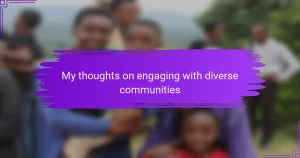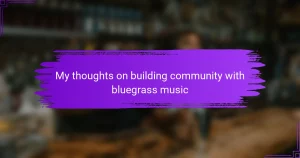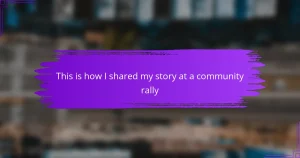Key takeaways
- Local leaders are integral to community decisions, and building personal connections with them can foster real change.
- Community engagement creates trust and collaboration, enabling collective problem-solving and innovative solutions.
- Identifying local leaders involves recognizing those who actively participate in community discussions and initiatives, not just those with formal titles.
- Authenticity and persistence in building relationships with leaders lead to meaningful collaborations and impactful community improvements.
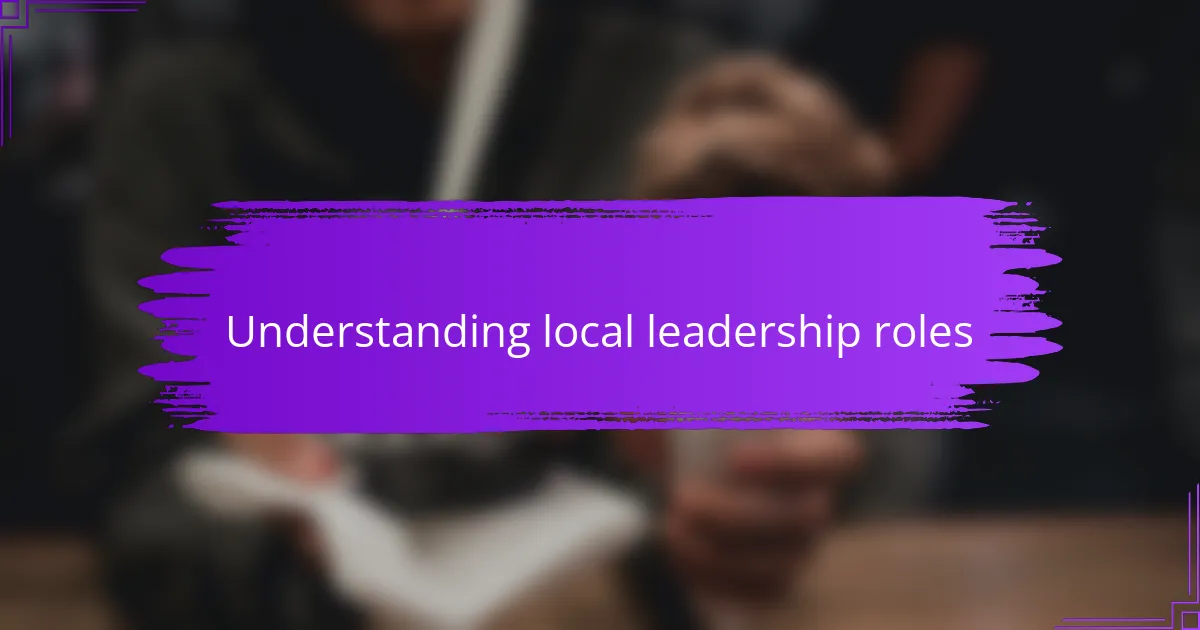
Understanding local leadership roles
Local leaders often wear many hats, from city council members to school board representatives, each playing a unique role in shaping our communities. Have you ever wondered who actually makes decisions about local parks or school funding? Understanding these roles helped me see where change truly starts.
When I first reached out, I realized that these leaders aren’t distant figures; they’re neighbors with a passion for improvement. That shift in perspective made my involvement feel less daunting and more personal. Knowing who to talk to—and what they can influence—was the key to turning my concerns into action.
It’s fascinating how much impact local leadership has on daily life, often more than national politics. Recognizing their power made me ask myself: Why wait for big changes when so much can happen right at home? This realization fueled my commitment to connect and collaborate with those leaders.
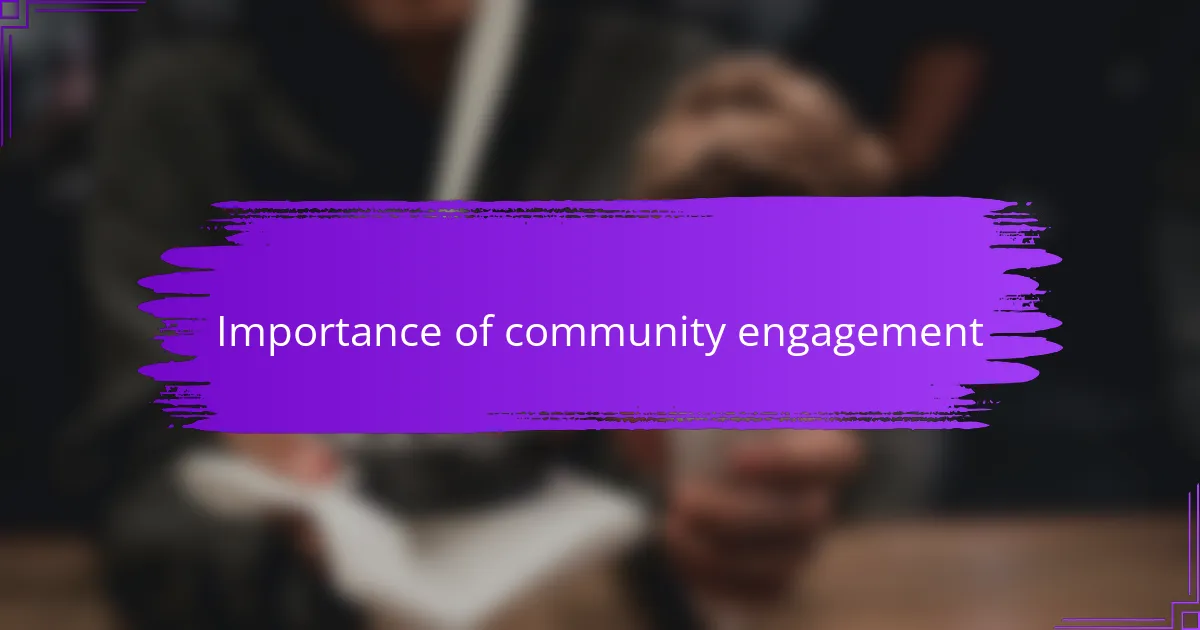
Importance of community engagement
Community engagement isn’t just a civic duty—it’s the lifeblood of real change. When I first started attending local meetings, I was surprised by how welcoming people were and how much passion they had for making things better. It made me wonder: What could happen if more of us took that small step to show up and speak out?
There’s a powerful connection that forms when you engage with neighbors and leaders alike. I remember feeling energized after my first conversation with a council member who genuinely listened and remembered my concerns weeks later. That sense of being heard transformed my hope into action.
But it’s more than just voice or votes; it’s about building trust and shared goals. Community engagement creates a space where ideas can grow and solutions take shape—often in ways you can’t predict. Have you experienced that moment when a simple dialogue sparks a ripple of change? I have, and that’s what keeps me coming back.
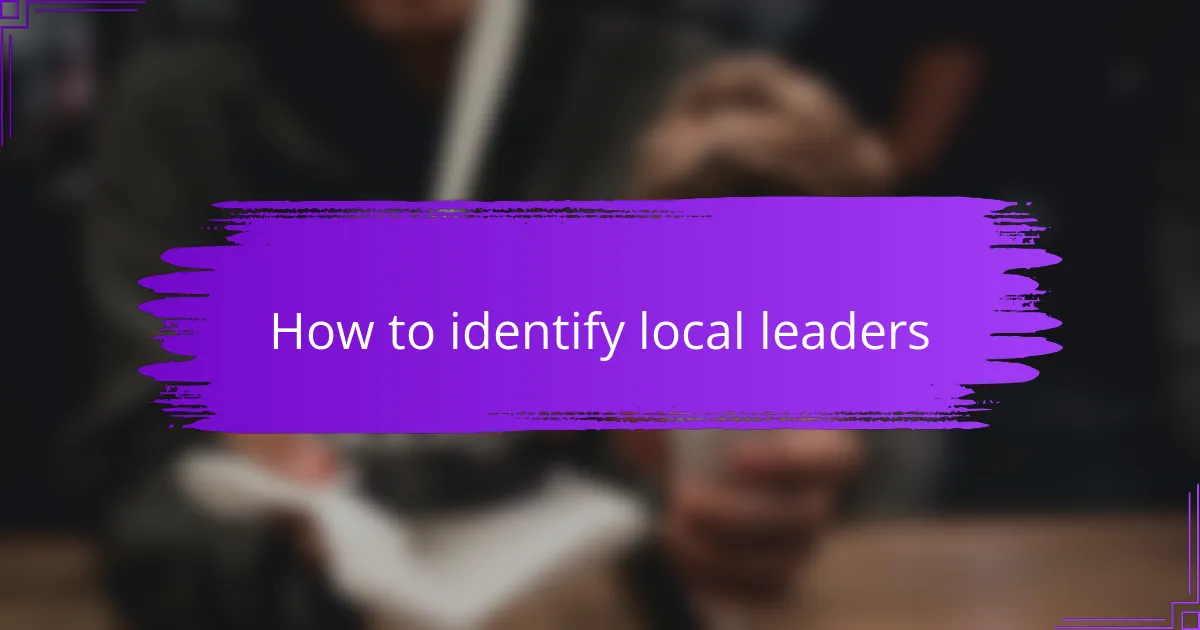
How to identify local leaders
Spotting local leaders isn’t always obvious at first. I used to think leadership meant big titles or flashy campaigns, but soon I realized many leaders show up quietly at neighborhood events or volunteer meetings. Have you ever noticed who people turn to for advice during a community issue? That’s often a sign someone is stepping up to lead.
One way I found helpful was paying attention to who voices concerns regularly at town halls or who organizes local drives. These folks might not be on the ballot, but their dedication shapes real change behind the scenes. I remember connecting with a community organizer who wasn’t an elected official but had incredible influence because everyone trusted her judgment.
Sometimes, the best leaders are those who listen more than they speak. I’ve found that those who ask questions and genuinely seek to understand community needs often hold the keys to making progress. When you recognize these traits, it’s easier to approach someone with confidence—and sometimes, that’s all it takes to start a meaningful conversation.
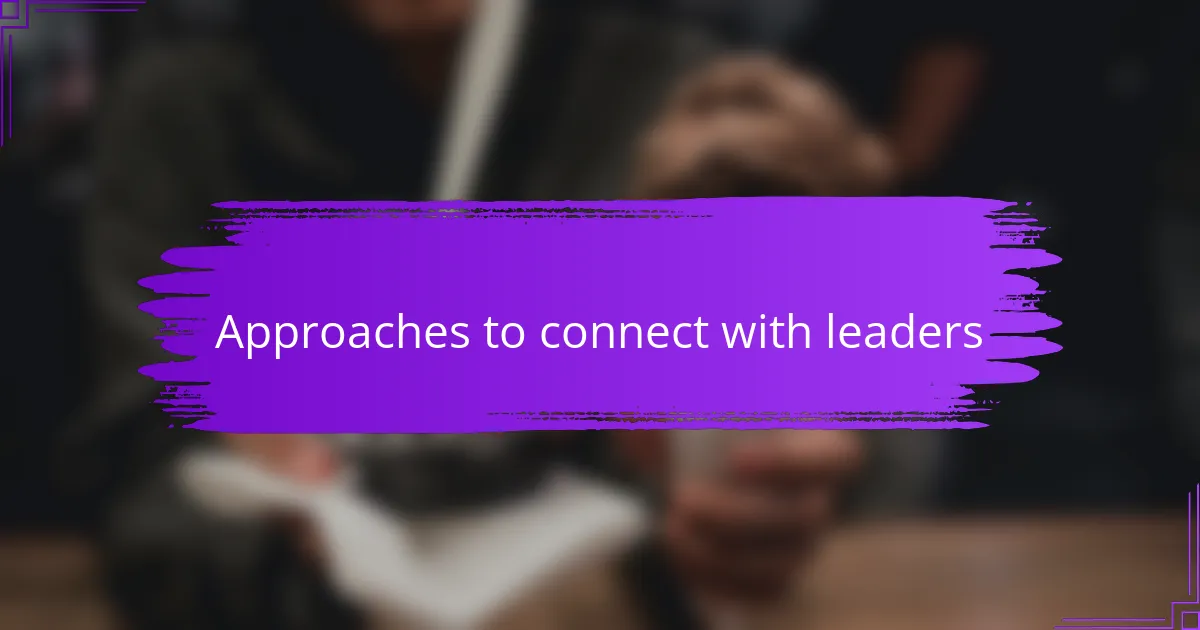
Approaches to connect with leaders
When I first reached out to local leaders, I found that showing genuine interest in their work opened doors more than formal requests ever did. Have you noticed how people respond when you ask about their passions instead of just their titles? That simple shift made my conversations more heartfelt and impactful.
I also learned that attending events they care about—like community clean-ups or school board hearings—creates natural moments to connect. One time, I casually chatted with a council member while we both picked up trash, and that shared experience made our follow-up meeting much easier and more relaxed.
Sometimes, the key is persistence without pressure. I kept following up with emails and attending meetings, and slowly, I became a familiar face rather than just another voice in the crowd. That consistency built trust, showing me that real connection is more about presence than a single perfect approach.
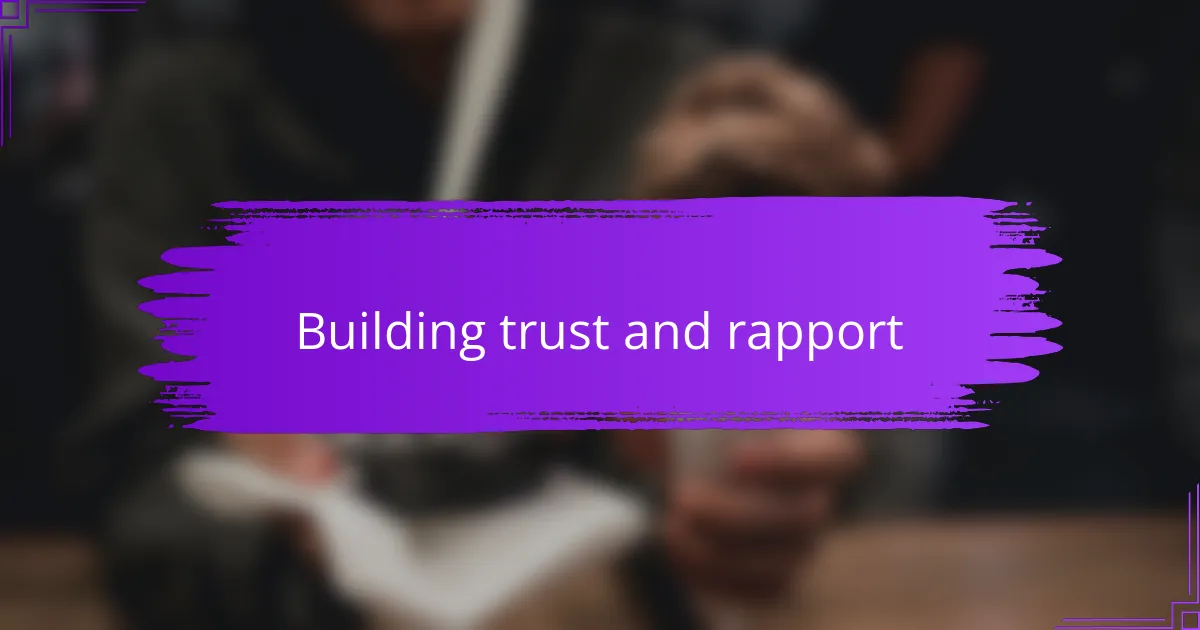
Building trust and rapport
Building trust didn’t happen overnight. I remember my first meeting felt awkward—I wasn’t sure if I was being taken seriously or seen as just another outsider. But as I kept showing up and listening intently, I noticed smiles replaced skepticism and doors began to open.
What struck me most was how trust grew from small moments: remembering a leader’s family details or following up on something they mentioned weeks ago. These little acts made the relationship feel genuine, not transactional. Have you ever experienced how a simple gesture can turn a stranger into an ally?
It’s that authenticity that forms the foundation of rapport. When I shared my own stories and vulnerabilities, leaders responded with openness, creating a space where collaboration felt natural. Building trust, I learned, is as much about being human as it is about shared goals.
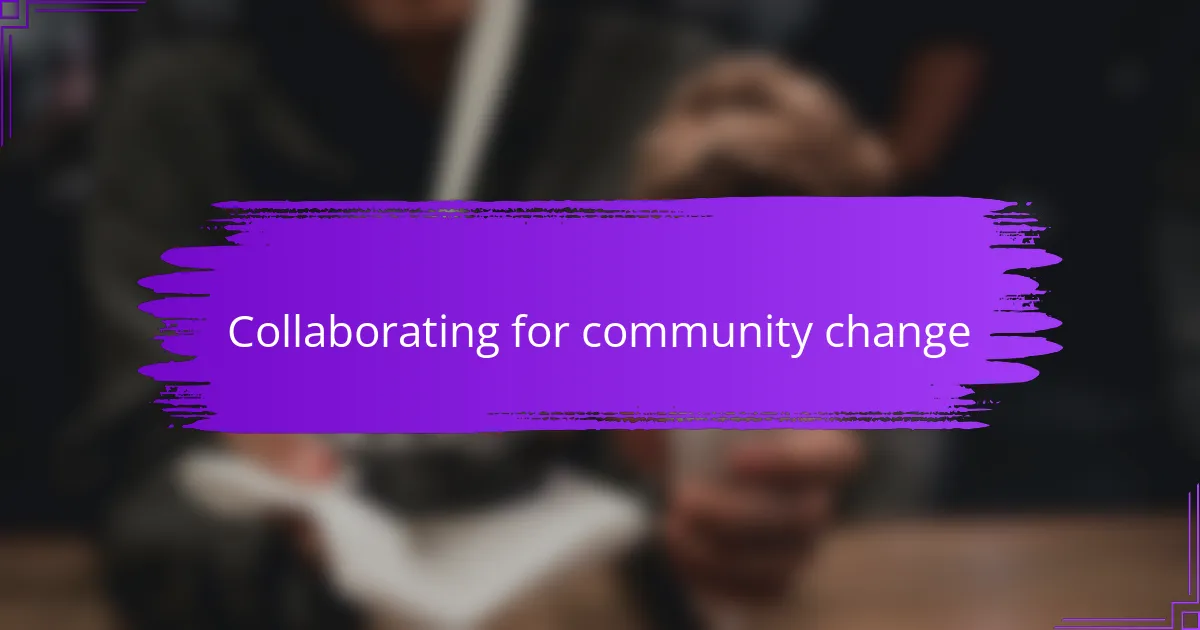
Collaborating for community change
Collaborating for community change felt like stepping into a new world where shared vision mattered more than individual agendas. I quickly realized that it wasn’t about pushing my ideas alone but about weaving together diverse perspectives to find common ground. Have you ever been surprised by how much more powerful a solution becomes when it reflects the whole community’s voice? That’s exactly what I experienced in those early conversations.
One memorable moment was when a local leader and I co-hosted a small gathering to discuss a neighborhood safety concern. Seeing people who usually kept to themselves speak up and listen to one another was inspiring. It made me think: isn’t that the real heart of change—coming together with respect and purpose, not just loud demands?
Collaborative work also taught me patience and resilience. Change doesn’t happen overnight, and sometimes the process felt slow or frustrating. But those moments when leaders and community members find alignment, celebrate small victories, or just commit to keep showing up—those moments reminded me why the effort matters. What’s been your experience with collaboration? For me, it’s been a journey of learning, connecting, and believing in the collective power we all hold.
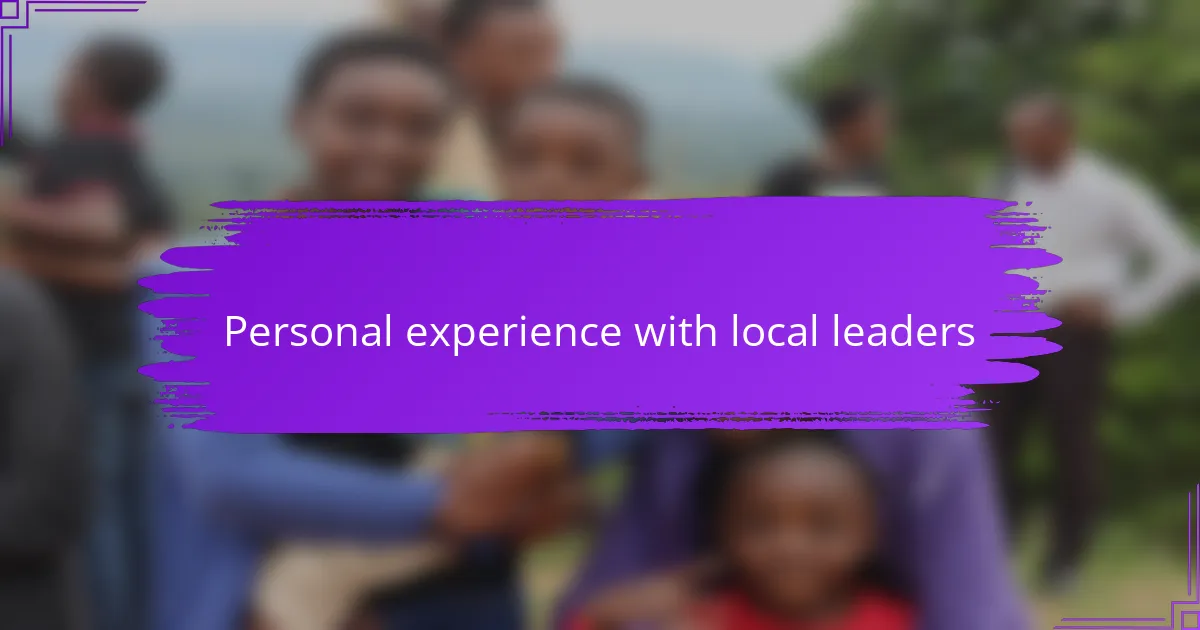
Personal experience with local leaders
When I first met with a local leader, I was surprised by how approachable and down-to-earth they were. Instead of the formal, distant figure I imagined, I found someone genuinely interested in hearing my concerns and working together to find solutions. Have you ever felt a connection so real that it changed how you see leadership? That’s exactly what happened to me.
One moment that stands out was when a school board representative remembered a problem I raised months earlier and followed up with actionable steps. It made me realize that these leaders aren’t just decision-makers—they’re people who care deeply about their community’s well-being. That kind of attention gave me confidence that my voice could matter.
I’ve also learned that openness and sincerity open doors with local leaders more than rehearsed speeches. Sharing my story and listening to their challenges created a bond built on trust, not just politics. Isn’t it amazing how genuine conversation can transform strangers into collaborators? For me, that’s been the heart of building meaningful relationships in local change.
